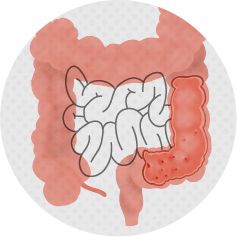Ulcerative colitis is a chronic inflammatory condition that affects the large intestine. Reducing inflammation helps heal the intestine and relieve the symptoms.
Biologics are a type of medication that doctors prescribe to treat moderate-to-severe ulcerative colitis. They work by blocking the inflammation responsible for the condition. Multiple types of biologics are available.
Doctors also prescribe other types of medications for moderate-to-severe ulcerative colitis, including Janus kinase (JAK) inhibitors and corticosteroids.
Read on to learn more about biologics for ulcerative colitis.
Biologics are medications that doctors use to treat chronic inflammatory conditions such as inflammatory bowel disease (IBD). Ulcerative colitis is one type of IBD.
These laboratory-made antibodies are targeted to block specific proteins responsible for the inflammation that drives ulcerative colitis. This makes biologics different from medications such as corticosteroids, which may cause more severe side effects.
The Food and Drug Administration (FDA) has approved the following biologics to treat moderate-to-severe ulcerative colitis:
- anti-tumor necrosis factor (anti-TNF) agents, including:
- infliximab (Remicade)
- adalimumab (Humira)
- golimumab (Simponi)
- vedolizumab (Entyvio), which is an integrin receptor antagonist that blocks a specific type of receptor present in the gut
- ustekinumab (Stelara), which is an interleukin-12 and interleukin-23 antagonist
The FDA approved the biosimilars of infliximab and adalimumab. As their name suggests, biosimilars are very similar to the originally approved biologics but may be more cost-effective.
A person may receive biologics as an injection or as an infusion through an intravenous line.
The method of use, dosage, and frequency varies from one type of biologic to another.
Doctors typically prescribe an anti-TNF agent before they prescribe other types of biologics for moderate-to-severe ulcerative colitis. This is because anti-TNF medications are the most studied treatments.
Doctors may prescribe another type of biologic or a JAK inhibitor if the anti-TNF agent:
- does not reduce the symptoms enough
- stops working over time
- causes too many side effects
- is not safe for a person to use due to their medical history
Every person responds differently to these medications.
Sometimes, doctors first prescribe a JAK inhibitor instead of a biologic. This medication blocks inflammation pathways involved in ulcerative colitis.
JAK inhibitors can include tofacitinib (Xeljanz) or upadacitinib (Rinvoq).
Biologics can help bring ulcerative colitis into remission. Remission occurs when the symptoms of ulcerative colitis are gone.
A 2020 review of research found that Remicade was the most effective biologic for reducing the signs and symptoms of ulcerative colitis in people who had never used biologics before.
The same review found that Stelara was the most effective biologic for treating ulcerative colitis in people who had used anti-TNF agents in the past without satisfying results.
Tofacitinib (Xeljanz) was also highly effective for treating ulcerative colitis in people who had previously used anti-TNF agents. Xeljanz is a JAK inhibitor, which is not a biologic.
These results reflect average trends. Different medications may affect different individuals in different ways. People may need to try multiple medications to find one that works for them.
The authors of one 2019 review reported that
The benefits of biologics may outweigh the potential risks in people with moderate-to-severe IBD.
However, biologics can affect how the immune system works. Specifically, they may affect the immune system’s ability to ward off certain infections.
The risk of infection tends to be higher with anti-TNF agents than with other types of biologics.
The 2020 review of research found that the overall rate of serious infections in people using biologics was low. Entyvio was the safest biologic for treating ulcerative colitis. It was linked to the lowest number of infections.
The authors ranked Stelara as the next safest biologic for treating ulcerative colitis.
Biologics may carry other risks of side effects. A person should speak with a doctor about the potential risks of biologics before they use them.
Long-term studies have so far found that anti-TNF agents are acceptably safe, according to a
However, biologics are relatively new medications. For this reason, long-term safety data are limited.
Scientists have completed fewer long-term studies on Entyvio or Stelara. The available data suggest that these biologics are safer than anti-TNF agents.
People with moderate-to-severe ulcerative colitis may need to use biologics on an ongoing basis to keep the condition in remission. Stopping treatment with biologics may cause a relapse, during which symptoms return.
More research is necessary to confirm if and when people can stop using biologics without experiencing a relapse.
If a biologic stops working or causes unbearable side effects, a doctor may prescribe another type of biologic or another treatment option.
Some research has linked biologics to modest weight gain in people with ulcerative colitis.
One
People who started treatment with biologics gained an average of 1.33 kilograms (kg) to 2.31 kg after 54 weeks. Weight gain was higher in people with Crohn’s disease than those with ulcerative colitis.
Ulcerative colitis may reduce the body’s ability to absorb water and some nutrients. Its symptoms may also reduce a person’s appetite or desire to eat.
This can lead to low weight and malnutrition in some people with ulcerative colitis. Those people may benefit from the weight gain associated with biologics.
Weight gain is less beneficial for people with excess weight or obesity. Those people may wish to speak with a doctor to learn about the potential risks of weight gain and how to manage it.
Treatment with biologics can reduce symptoms of moderate-to-severe ulcerative colitis.
Some research suggests that anti-TNF agents tend to be more effective than other biologics at reducing the signs and symptoms of ulcerative colitis. However, Entyvio and Stelara appear to be safer.
A person with ulcerative colitis may wish to speak with a doctor to learn about the potential benefits and risks of different treatments, including different biologics.
The doctor can help them weigh the pros and cons of different treatment approaches for ulcerative colitis. They will consider the person’s condition, overall health, and treatment priorities.

